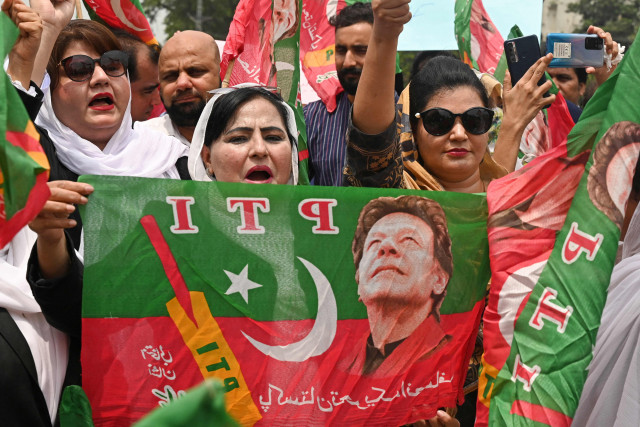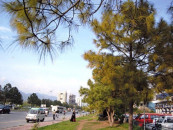PTI still awaits Isa's proactive stance
Senior lawyers fear superior courts might lose relevance if they fail to deliver relief

Chief Justice of Pakistan (CJP) Qazi Faez Isa – otherwise homed in on holding the “untouchables” answerable – has seemingly shown restraint from stirring the pot further, steering clear of creating obstacles for state institutions in their dealings with the Pakistan Tehreek-e-Insaf (PTI) since the May 9 incidents.
The chief justice has on many occasions voiced full-throated concerns over thorny structural issues while laying out his priorities to set precedents. He has jumped into the fray immediately becoming the most prolific questioner among the justices.
However, the PTI workers, asserting that they face similar challenges from powerful circles, still await the proactive stance they anticipate from him.
Key judicial proceedings, including the non-implementation of the Faizabad dharna judgment and the completion of ex-military ruler Pervez Musharraf's treason trial posthumously, may have far-reaching consequences, potentially unsettling 'powerful circles' in the future.
The ongoing trial's continuity is crucial, especially if the apex court upholds the special court's decision on the death sentence for the former military dictator. Such a precedent could have implications for those considering abrogating the constitution in the future.
Another retired military officer could potentially find himself in deep trouble due to the implementation of the Faizabad Dharna judgment.
PTI still awaiting relief
However, as Justice Isa delves into a myriad of sensitive issues, championing accountability and challenging the powerful, substantial relief is yet to be extended to PTI workers.
This, observers note, is a departure from the approach taken by his predecessor Umar Ata Bandial, who invited chagrin from both the security establishment and the PDM-led government for providing relief to PTI.
Ex-CJP Bandial had notably encountered a challenging tenure, with parliamentary scrutiny intensifying since the suo motu jurisdiction was invoked in holding the general elections of the Punjab Assembly in February.
While the former CJP did not issue any judicial verdict directly impacting the establishment's interests during his tenure, tensions were palpable.
Another notable aspect of CJP Isa’s tenure is the scrutiny of the internal workings of the Supreme Court during his predecessor's tenure.
He has raised questions about the Supreme Court Human Rights Cell operating without defined rules and regulations, as well as the passing of directives by ex-CJP Mian Saqib Nisar in his chamber.
On the other hand, the Supreme Judicial Council (SJC), led by CJP Isa, has issued a show-cause notice to SC Judge Justice Sayyed Mazahar Ali Akbar Naqvi, who is confronting multiple misconduct charges.
The unfolding developments in this matter are of particular interest, especially given Justice Naqvi's expressed mistrust in CJP Isa as the head of the council.
The CJP has exhibited restraint regarding the state's actions towards PTI since the May 9 incidents. The top court, under his leadership, has refrained from issuing directives that could undermine the state's plans concerning PTI, despite his involvement in announcing the general elections date on February 8, with PTI being one of the petitioners.
Imran Khan has sought post-arrest bail in the Supreme Court in the cypher case, challenging the framing of charges. The cases are yet to be scheduled for a hearing.
Meanwhile, criminal matters related to PTI leaders are listed in the bench led by Justice Sardar Tariq Masood. However, PTI supporters have expressed disappointment in the bench's decision to suspend the Peshawar High Court order that stopped law enforcement agencies from arresting PTI leaders in other cases after granting bail.
Similarly, concerns are rising as senior lawyer Chaudhry Aitzaz Ahsan's petition against enforced disappearances, aimed at rescuing PTI leaders being picked up without law and regulation, was returned by the SC Registrar's office.
Moreover, on October 23, a larger bench comprising five judges, headed by Justice Ijazul Ahsan, declared the trial of 103 civilians in military courts as unconstitutional.
Despite the judicial order, 103 civilians remain in the custody of military authorities.
Nevertheless, the government intends to challenge the decision of the larger bench.
‘Losing relevance’
The imprisonment of five PTI females over their involvement in the May 9 incidents has not seen relief from the superior courts, prompting fears among senior lawyers that the courts may lose their relevance if they cannot provide timely relief to activists from one party.
As CJP Isa grapples with the challenge of ensuring justice for all amidst the current political climate, his tenure, set to end in a year, will undoubtedly be judged by history.
Legacies of ex-CJPs Iftikhar Muhammad Chaudhry and Mian Saqib Nisar remembered for their perceived biases against PPP and PML-N respectively, loom large in the background.
On a parallel note, PTI supporters have continued to criticize CJP Isa since assuming office.
Experts say that the PTI leaders must reflect on their policy of trolling army officers, media persons, and judges, as it has adversely affected the party's political standing.
Adopting a more constructive approach may be essential for PTI to restore its political position.



















COMMENTS
Comments are moderated and generally will be posted if they are on-topic and not abusive.
For more information, please see our Comments FAQ